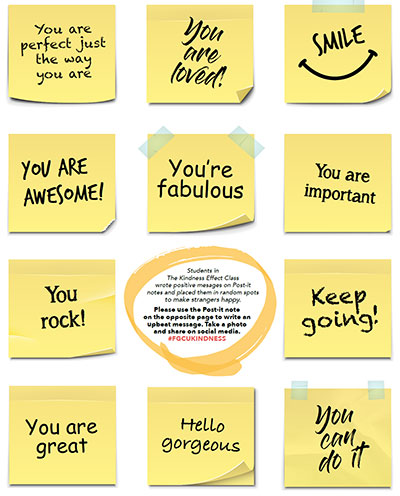 That’s where The Kindness Effect comes in. This innovative class taught by FGCU adjunct instructor Francesca Donlan aims to do just that. Those who predicted students would enroll in this class intent on an easy three credits, had it all wrong. Kindness as a way of life is challenging, as Donlan’s 35 students soon learned.
That’s where The Kindness Effect comes in. This innovative class taught by FGCU adjunct instructor Francesca Donlan aims to do just that. Those who predicted students would enroll in this class intent on an easy three credits, had it all wrong. Kindness as a way of life is challenging, as Donlan’s 35 students soon learned.
“I figured it couldn’t hurt to learn about kindness and improve our quality of life,” said Maria Roversi, a senior psychology major. “But honestly, this class was even better than I imagined.”
Picture 35 college students totally engaged in their weekly three-hour class, disappointed when it’s over. Thirty-five students participating in meaningful discussions, sharing poignant stories – about life, daily challenges, how crazy it is that a kindness class is so important in today’s world.
“This class is different every week,” Roversi said. “We talk about projects we’ve done; we listen to each other. There’s a lot of storytelling, sharing of things encountered, things learned. Professor Donlan is high spirited, and her spirit and energy are contagious. Even if you’ve had a bad day, you feel the energy.”
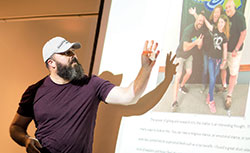
“We, as a society, are suffering a kindness deficit,” Donlan said. “Especially in the digital age where a quick text substitutes for a more meaningful face-to-face conversation. People tend to forget they have the power to be kind.”
Required reading for the course includes “The War for Kindness: Building Empathy in a Fractured World” by Jamil Zaki, Stanford University associate professor of psychology and head of the Stanford Social Neuroscience Laboratory. Zaki writes: “Through practice, we can grow our empathy and become kinder as a result … Empathy is not a superpower … It’s a regular old power, like being strong, agile or good at Scrabble. Some people are genetically predisposed to be stronger than others – but strength is also up to us. Live a sedentary life, and your muscles will atrophy. Stay active, and they’ll grow.”
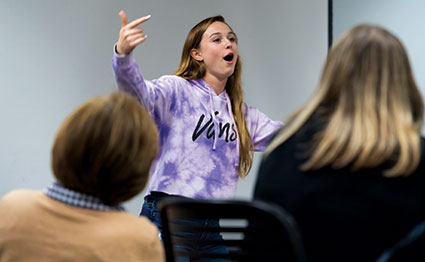
Donlan has set out to reintroduce the power of kindness to her students, strengthening the kindness “muscle” by teaching kindness techniques and sharing research on how kindness and empathy impact the social, psychological and emotional well-being of those who practice it.
Research supports Donlan’s efforts and suggests that human beings are prewired to be kind. Jerome Kagan, emeritus professor of psychology at Harvard University, writes, “Although humans inherit a biological bias that permits them to feel anger, jealousy, selfishness and envy … they inherit an even stronger biological bias for kindness, compassion, cooperation, love and nurture.”
This isn’t to say that kindness is an automatic reflex – it’s not a ‘We’re born, therefore we’re kind.’ Which brings us full circle back to a class that focuses on strengthening our kindness ‘muscle.’
Donlan teaches her students that kindness has many benefits, not only for the recipient but also for the practitioner. In “The Effects of Kindness on the Brain,” published on the website ExploringYourMind, the author writes: “Daniel Goleman [Ph.D. Harvard] reminds us that one of the most intense emotions for the brain is compassion. The entire limbic system [brain structures that help control emotions] reverberates when we feel it.”
Bottom line: Kindness matters. In Donlan’s class, students explore through first-hand experiences if acts of kindness change them. If yes, they ask themselves, “Is that change superficial and temporary, or meaningful and lasting? What are the effects of kindness – or lack thereof – on society and its implications for our collective future?”
Each week, Donlan assigns a kindness challenge. For example: compliment three people face-to-face; write three thank-you notes; place complimentary sticky notes in random places to surprise people. Be kind to yourself. Sound simple?
“Some students experienced a lot of anxiety with these assignments,” Donlan said. “But they found they began to develop more meaningful relationships as a result. For some students, the relationships were life changing.”
Abby Kurtz-Lendner, a sophomore majoring in communication, said, “This class definitely exceeded all my expectations. It’s really nice to see an entire group of people wanting to make the world a little kinder. A class on kindness is a crazy concept, but it’s probably the most important class anyone needs.”
“Too often, we think we have to be rich or important to make our voice matter,” Donlan said, “but we can all be kind and change people’s lives. Students quickly found they had the power to make a difference in someone’s life.”
But, she said, kindness isn’t all about being kind to others. Donlan found that although many of the students perceived themselves as kind, “most are not kind to themselves.” When charged with a self-kindness assignment, Jonathan Robertson, a senior integrated studies major, was at a bit of a loss. A retired veteran who served in the U.S. Navy for 20 years, he said, “Lots of times we forget to turn inward; we’re too busy. We don’t take the time we need for ourselves, whether simply to relax or to heal.”
Like Kurtz-Lendner, Robertson concedes that a class teaching kindness is a little unusual. “It’s crazy when you think of it. Kindness should be a common-sense thing. Unfortunately, it really isn’t. But the more you look into kindness, and the more you shift your focus to kindness, you realize there’s a lot of good stuff going on and a lot of good people out there.”
The whole topic of kindness attracts, well, kind people. Sharon Arnold, retired partner in the Southwest Florida public relations firm Gravina, Smith, Matte and Arnold, is one. Over the years, Arnold has been involved in multiple charitable causes, and when she heard that Donlan was looking for a sponsor for one of her class assignments, Arnold said without hesitation, “I’m in. I think the whole concept of a kindness class is wonderful. It’s very exciting to see young people taking kindness seriously.” Arnold donated $350 to Donlan, who then distributed $10 to each student. The assignment: Do something, anything, kind with the money. Students then shared their stories in a class that can only be described as uplifting and inspiring (see sidebar).
Of the class and lessons learned, Robertson said, “The power of giving is interesting. You can take a religious stance, an emotional stance, or something even less connected on a personal level such as a tax benefit. No matter the reason that others may give, for me, knowing that I made a difference, even if it’s a small one, is pleasing to me,” said Robertson.[/vc_column_text][vc_column_text]
TIPS FOR BEING KIND TO SELF AND OTHERS
![]() It’s not hard to find kindness tips. Simply google “Kindness Tips,” and you’re there. Just to get us started, what follows is a random selection of tips from a random selection of sites.
It’s not hard to find kindness tips. Simply google “Kindness Tips,” and you’re there. Just to get us started, what follows is a random selection of tips from a random selection of sites.
- Express gratitude – even for the smallest things – by simply saying “Thank you.”
- Speak words of encouragement to someone experiencing adversity.
- Be patient if treated unkindly.
- Breathe deeply.
- Send a card to a service man or woman overseas.
- Hand-write a “thank you” note.
- Forgive a wrongdoing and let go of past resentments.
- Compliment a stranger.
- Practice gratitude.
- Drink lots of water.
- Exercise.
- Volunteer your time.
- Disconnect every now and again.
- Accept compliments graciously.
- Don’t forget to play.
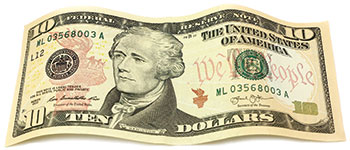 THE “$10 FOR KINDNESS“ CHALLENGE
THE “$10 FOR KINDNESS“ CHALLENGE
Sharon Arnold, retired public relations executive, donated $350 in support of Instructor Francesca Donlan’s The Kindness Effect class. Donlan then distributed $10 to each of her 35 students with the directive to “spend it kindly.”
In a class later that month, the students shared their stories. Their enthusiasm was palpable. Students were engaged and inspired — and inspiring.
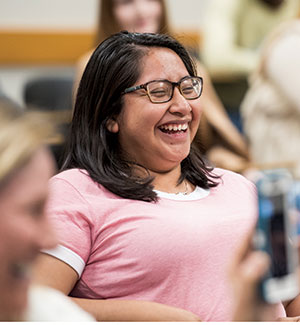
Senior psychology majors Maria Roversi and Lexi Oakley teamed up to buy baby clothes and maternity outfits for a pregnant friend graduating from FGCU this year. They combined their $10 and each added some money of their own. Their friend, who didn’t show much reaction when presented with the gift, told them later when she wore the outfit, “I felt very beautiful today.”
Oakley said she learned, “When you are giving, don’t wait for validation. You should do it to make the other person feel good.”
Brianna Marshel, a senior communication major, submitted a video of her buying toys at Dollar Tree — sidewalk chalk, mini footballs and more. She then headed to the Golden Gate Community Park to distribute them to the children, who clearly loved the toys. “A lot of kids’ parents have to work on the weekends, and the park is their babysitter,” Marshel said. “I don’t think what I did was groundbreaking, but I hope I improved the day for these kids.”
When Jonathan Robertson’s daughter came home from school with a note from her teacher asking for a $3 donation to help fund a field trip, the senior integrated studies major sent his daughter to school with $6 — three to cover his daughter and $3 to cover another child. That left him with $4. “My whole thought was how can I make the most impact with $10?” he said. “I didn’t want to do it in one shot.”
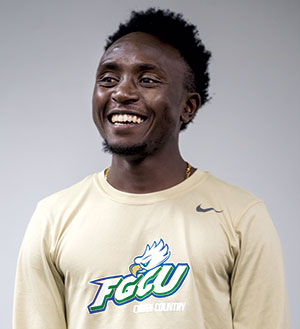
As it happens, Robertson is DJing this spring for FGCU’s Dance Marathon, a fundraiser for Johns Hopkins All Children’s Hospital. “I decided to make a donation to the Dance Marathon,” he said.
The stories went on and on. Shoes and socks for a homeless man; a bouquet of flowers for a student’s grandmother in the nursing home; $10 for a young man working on the side of the road as a sign spinner. And, while virtually all the students thanked Arnold for the gift and for the experience, she, too, was moved. “It’s the best $350 I’ve ever spent,” she said.[/vc_column_text][vc_column_text]
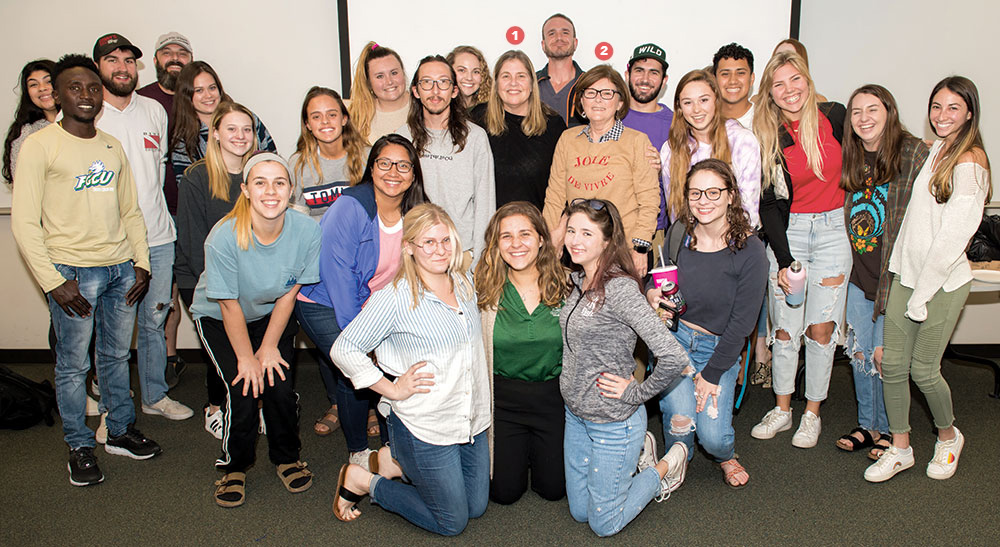
ROOTS OF COMPASSION AND KINDNESS PROGRAM PLANNED IN THE HEART-MINDED CHILD
An anonymous donor has gifted FGCU $70,000 to develop programming to teach empathy and compassion to elementary and middle school children. Maria Roca, chair of the Department of Integrated Studies, and her colleagues are tasked with designing the program, which will debut in the fall.
“We’re in the process of talking with the local schools,” said Roca of the department’s initial outreach. “Also, the donor is interested in our building a parent component to the project,” which, Roca agreed, will add value to the overall project. At the same time, FGCU will train its students to go out into the schools and lead the way. “This type of programming is custom made for the Integrated Studies department,” Roca said.
A brief description of the B.A. in Integrated Studies reads as follows: “The program provides flexibility in meeting individual student interests and learning goals and blends existing and new experiences, information and perspectives into the learners’ total understanding of their world.”[/vc_column_text]